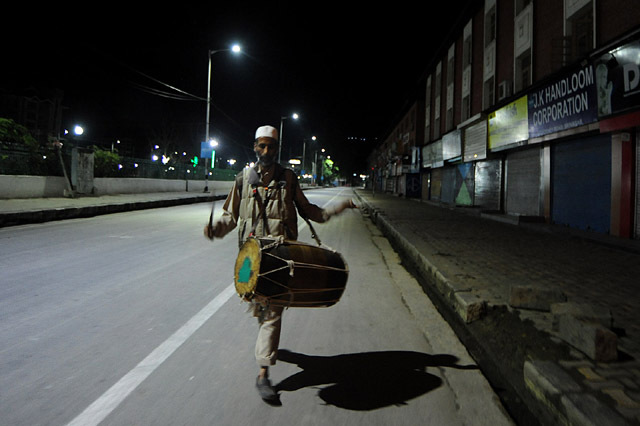During the holy month of Ramadan, when the believers fall asleep in the wee hours after staying up late praying, the reverberating drums of the Sahar Khan have long traditionally been useful to help people to get up for eating the pre-dawn meal, the Suhoor.
Sehar Khan, the traditional human alarm clock chants the hymns and rouses people for Waqt-e-Sahar (pre-dawn meal) while beating a drum to wake the believers up.
Abdul Gani, the Sahar Khan, while beating his drum loud and fast in the lanes and by-lanes of Pulwama town passes through one colony after another, along with his elder son, Irfan Gani, who walks along side him holding up a halogen light for his father and himself.
Though people in Kashmir now also rely on their own mechanic and electronic alarm clocks, but the tradition of Sahar Khan beating drum and calling people to eat pre-dawn meal is continuing.
55-year-old Abdul Gani while narrating his experience of being a Sahar Khan said: “I am so passionate about my job. I am doing this job to earn more goodness and deeds which will help me to enter the Heavens in hereafter and of course for the some money as well for the livelihood of my family.”
Gani Said, “I have been beating the drum in the Ramadan for five years now and this job gives me a satisfaction and I wish my son would do the same after me.”
He said traditional alarm clock in the form of Sahar Khan in Kashmir has its own impact to wake up the believers in the Valley.
Gani starts his journey at 2 am from his home. While chanting the wakeup call Waqt-e-Seher he continues beating the drum for around five kilometers to wake the people up.
He said when he was a child a Sahar Khan used to visit the e lane where he lived. He said he would go to the top floor to see drummer.
Gani said he felt the life of the Sahar Khan was very adventurous and thought to become one.
Gani’s son Irfan said that his father is working as a daily wager for government and in the month of Ramadan he also works as a Sahar Khan for earning good deeds.
Traditionally the Sahar Khan after the Ramadan visits the homes and collects remunerations for his work, both in the kind as well as cash.
Despite alarm clocks, Sahar Khan remains relevant to wake believers up for Suhoor




